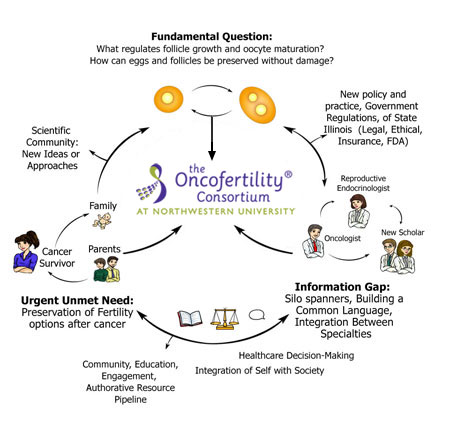 The Oncofertility Consortium® is a national, interdisciplinary initiative designed to explore the reproductive future of cancer survivors. Initial funding was provided by the National Institutes of Healththrough the NIH Roadmap for Medical Research/Common Fund.
The Oncofertility Consortium® is a national, interdisciplinary initiative designed to explore the reproductive future of cancer survivors. Initial funding was provided by the National Institutes of Healththrough the NIH Roadmap for Medical Research/Common Fund.
Survival rates among young cancer patients have steadily increased over the past four decades in part because of the development of more effective cancer treatments. Today, both women and men can look forward to life after cancer, yet many may face the possibility of infertility as a result of the disease itself or these lifesaving treatments. The Oncofertility Consortium® was developed to address the complex health care and quality-of-life issues that concern young cancer patients whose fertility may be threatened by their disease or its treatment.
The Oncofertility Consortium® brings together professionals in reproductive medicine, reproductive health research, oncology, biomechanics, materials science, mathematics, social science, bioethics, religion, policy research and educational sciences to expand current knowledge, research, clinical practice, and training for a wide spectrum of issues including:

- Mechanisms underlying the fertility threat of life-preserving cancer drugs.
- Methods for cryopreservation (freezing), storing and growing ovarian and gonadal tissue.
- In vitro follicle growth and oocyte maturation using a three-dimensional environment.
- Communication barriers between cancer patients and health care providers.
- Influence of gender, race/ethnicity, socioeconomic and family status on fertility-related decision making.
- Role of health care practitioners, clergy and counselors in decision making.
- Parental decision making by families facing a child’s cancer diagnosis.
- Ethical and legal concerns regarding the use of fertility preservation technologies in cancer patients.
- Cost/benefit analyses of fertility preservation options.
Below you’ll find links with information for patients, healthcare providers, and researchers, as well as resources that will help navigate the complex fertility issues facing patients with cancer and other serious diseases.
